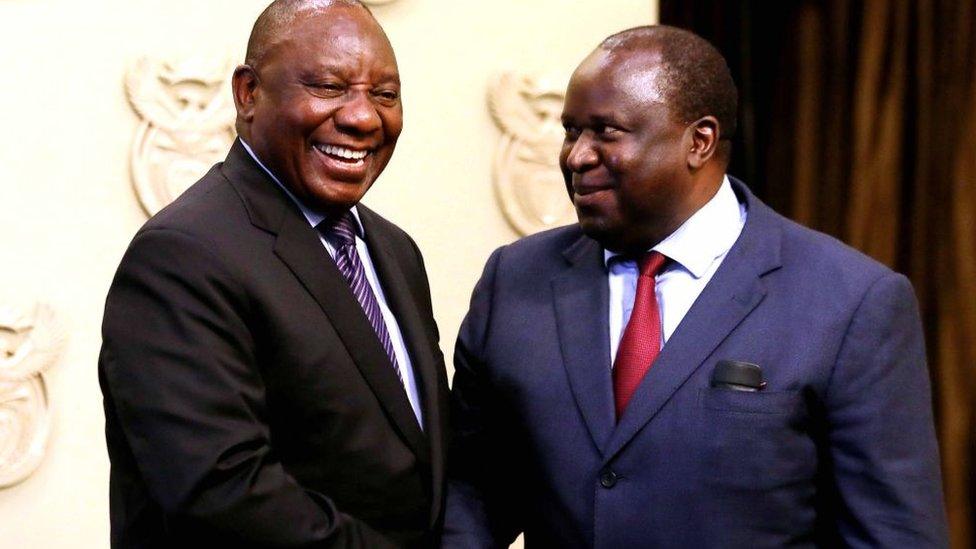Tito Mboweni: South Africa's president lambasts minister over Zambia tweets
- Published

President Ramaphosa (L) said Mr Mboweni's tweets were unfortunate and did not represent his government's views
South Africa's President Cyril Ramaphosa has "strongly reprimanded" his finance minister for tweets criticising the sacking of a top government official in Zambia.
"Presidents in Africa must stop this nonsense of waking up in the morning and fire a central bank governor," Tito Mboweni tweeted.
Mr Rampahosa said the comments did not reflect the views of his government.
Zambia's information minister said the tweets were "improper" and "immature."
Dora Siliya told Mr Mboweni to instead focus on South Africa's "coronavirus problems":
Allow X content?
This article contains content provided by X. We ask for your permission before anything is loaded, as they may be using cookies and other technologies. You may want to read X’s cookie policy, external and privacy policy, external before accepting. To view this content choose ‘accept and continue’.

South Africa has the highest number of coronavirus infections and deaths in Africa.
In a statement on Monday, President Ramaphosa called Mr Mboweni's comments "unfortunate", adding that the issue was being addressed "so that it does not occur again".
Mr Mboweni is known for his frequent, colourful and occasionally controversial use of Twitter. Mr Ramaphosa did not say how he would prevent a reoccurrence.
What did Mr Mboweni say?
In a series of tweets on Sunday, Mr Mboweni, a respected economist, challenged Zambia's President Edgar Lungu to give reasons for the sacking of Denny Kalyalya as the central bank governor.
"This is not some fiefdoms of yours! Your personal property?! No!," he tweeted, castigating President Lungu.
He threatened - in the since deleted tweets - that he would mobilise support if the governor was not reinstated.
"The governor was a good fella. Why do we do these things as Africans. The president of Zambia must give us the reasons why he dismissed the governor - or else hell is on its way. I will mobilise".
He later tweeted:
"Looks like I am in trouble about my statement on the dismissal of the bank of Zambia governor. I stand by my statement. Central bank independence is key. Not negotiable. Let all central bankers speak out."
But there won't be any support coming from the South African government.
Mr Ramaphosa said the country enjoyed a strong historical relationship and his government was "committed to maintaining the deep and solid bonds of friendship" with Zambia.
Mr Mboweni retweeted the statement.
Allow X content?
This article contains content provided by X. We ask for your permission before anything is loaded, as they may be using cookies and other technologies. You may want to read X’s cookie policy, external and privacy policy, external before accepting. To view this content choose ‘accept and continue’.

Who is Tito Mboweni?

The well respected economist is affectionately known on South African Twitter as "Uncle Tito".
It is his love for cooking that has won the hearts of many, but he is, let's say, not as talented in the kitchen as he is with numbers.
Apart from tweeting what he's making for dinner, his posts have sometimes put him at loggerheads with other state officials.
He doesn't seem to mind going against the party's line for what he believes in.
He has also been vocal about government decisions that he disagrees with, earning the admiration of some South Africans.
Still, he is a senior government official, hand-picked by the president to handle an important portfolio, and some of his rants, like the tweets excoriating the Zambian president, have been interpreted as divisive and unhelpful.
He once threatened to leave Twitter because it had become "abusive" and not the place for healthy debate he had hoped for - his hiatus was short-lived.

So why was Zambia's central bank governor sacked?
Denny Kalyalya was dismissed because of the poor disbursement of funds meant to stimulate the country's struggling economy, according to a statement by the ruling Patriotic Front party, the local Lusaka Times news site reports.
But the Reuters news agency reported that Mr Kalyalya's dismissal came barely three days after Zambia's central bank cut its benchmark lending rate by 125 basis points to 8% to try to safeguard the financial sector's stability and protect livelihoods in the wake of the Covid-19 pandemic.
Mr Kalyalya, a respected former World Bank executive director, was appointed in 2015 and his tenure was due to end in 2023. The main opposition leader Hakainde Hichilema has called his sacking "another sad development" in Zambia's history.
The BBC's Kennedy Gondwe in Lusaka says the governor's appearance on local media, where he repeatedly warned about the dire state of the economy could have led to his sacking.
President Lungu is facing a tough election next year and he would want to dispel a narrative of a struggling economy, which could bolster support for the opposition, our reporter added.
Mr Mboweni has been a champion of the independence of central banks from political influence - that's why he felt he had to speak up, he says.
- Published9 July 2024
